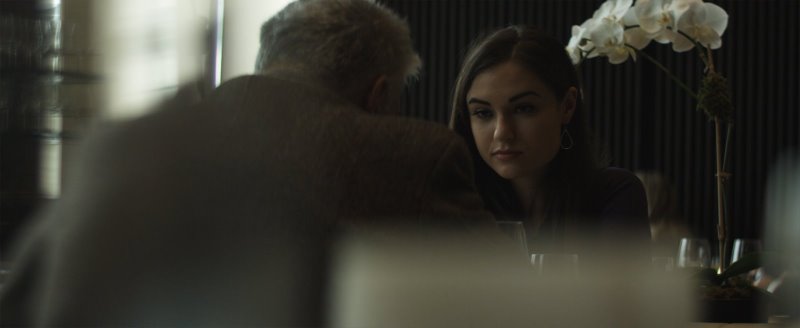The Girlfriend Experience
 Steven Soderbergh has managed to build an enviable career - he gets to make fun, huge projects like 'Ocean's Eleven', and alternates these with smaller, self-consciously serious films such as 'The Underneath', 'Kafka', and 'The Girlfriend Experience', which I saw this afternoon at the Chelsea Clearview next door to the Chelsea Hotel, in, as you might expect, Chelsea. Name of the lead character of this movie? It's an easy guess - my sense is that Soderbergh's protagonist, played by an adult film actor called Sasha Grey is supposed to represent an entire social cohort as well as an individual soul. In that regard, naming her after a part of New York City known for its cultural creativity and sociological excess seems not only obvious but just right.
Steven Soderbergh has managed to build an enviable career - he gets to make fun, huge projects like 'Ocean's Eleven', and alternates these with smaller, self-consciously serious films such as 'The Underneath', 'Kafka', and 'The Girlfriend Experience', which I saw this afternoon at the Chelsea Clearview next door to the Chelsea Hotel, in, as you might expect, Chelsea. Name of the lead character of this movie? It's an easy guess - my sense is that Soderbergh's protagonist, played by an adult film actor called Sasha Grey is supposed to represent an entire social cohort as well as an individual soul. In that regard, naming her after a part of New York City known for its cultural creativity and sociological excess seems not only obvious but just right.
'Just right' is how I felt about most, though not all, of the film - Grey is a sex worker who hires herself out for something more than sex: she approximates relationships, for an hour, or a night at a time. She has a boyfriend called Chris at home, who's also trying to sell his body - he's a personal trainer. It would not be unfair to say that her job eventually creates domestic tension.
The story is set against the cultural shift that was the US Presidential election of just over six months ago. Let me say it again: Just Over Six Months Ago. In that sense, it already feels dated; although that's not a criticism, just an indicator of how quickly things change, or give the appearance of changing.
And so, it's about the moral impetus of privatised capitalism (if I wanted to sound less pretentious I might translate that as 'it's about what happens when the love of money drives our sense of pleasure and satisfaction'), the status anxiety that is the shadow side of telling each other that we can achieve anything, and then defining that 'anything' purely in terms of materialism or celebrity, and something else that might sound even weirder: a hidden yearning for a return to pre-industrial society. One where it's easy to imagine being part of a community that actually did share its possessions, that actually did offer people much of what they needed, that simplified relationships, didn't idealise the nuclear family, didn't force people to create insatiable appetites for things.
Now I know it's easy to overstate the benefits of the past, the good old days and all that. So let me say this: I know that disease and violence were characteristic of the pre-industrial age, as much as any romanticised notion of extended families living together in pastoral bliss. But I also strongly suspect that the rates of depression, disappointment, and inability to sit still and think for a few minutes that seem to be characteristic of our contemporary culture have something to do with how we interpret what it means to be human. If we believe that the ultimate end of our lives is only to become fully self-actualised individuals, then the wider community will suffer.
What Chelsea in 'The Girlfriend Experience' does for a living is not the main point of interest here: she could just as easily have been an actor or a model or a salesperson on the floor of Macy's; because the movie is suggesting that we are all prostitutes; or at the very least, we are all subject to the impersonal forces of an economy that has abandoned gift exchange in favour of fast buck selling to the highest bidder. Or at least an economy that thinks it has the upper hand; it has pulled the wool over its own eyes. Because behind the stories of companies too big to fail and 'where's my bailout?', communities everywhere are rediscovering what a social structure based on mutuality could look like. We are only enslaved by money if we put our wrists in its shackles. Chelsea is a slave. So is Chris. So is everyone in this movie.
So, while it's gorgeous to look at, and amusing when it's observing the games people play (casting film critic Glenn Kenny as a self-appointed sex reviewer is funny and smart, and not just because he's great in the role), 'The Girlfriend Experience' is depressing. And if it represented what life is really like, instead of the delusions that we know can be cast away, and are in fact just waiting for us to see through them, we'd all have reason to be depressed too.
